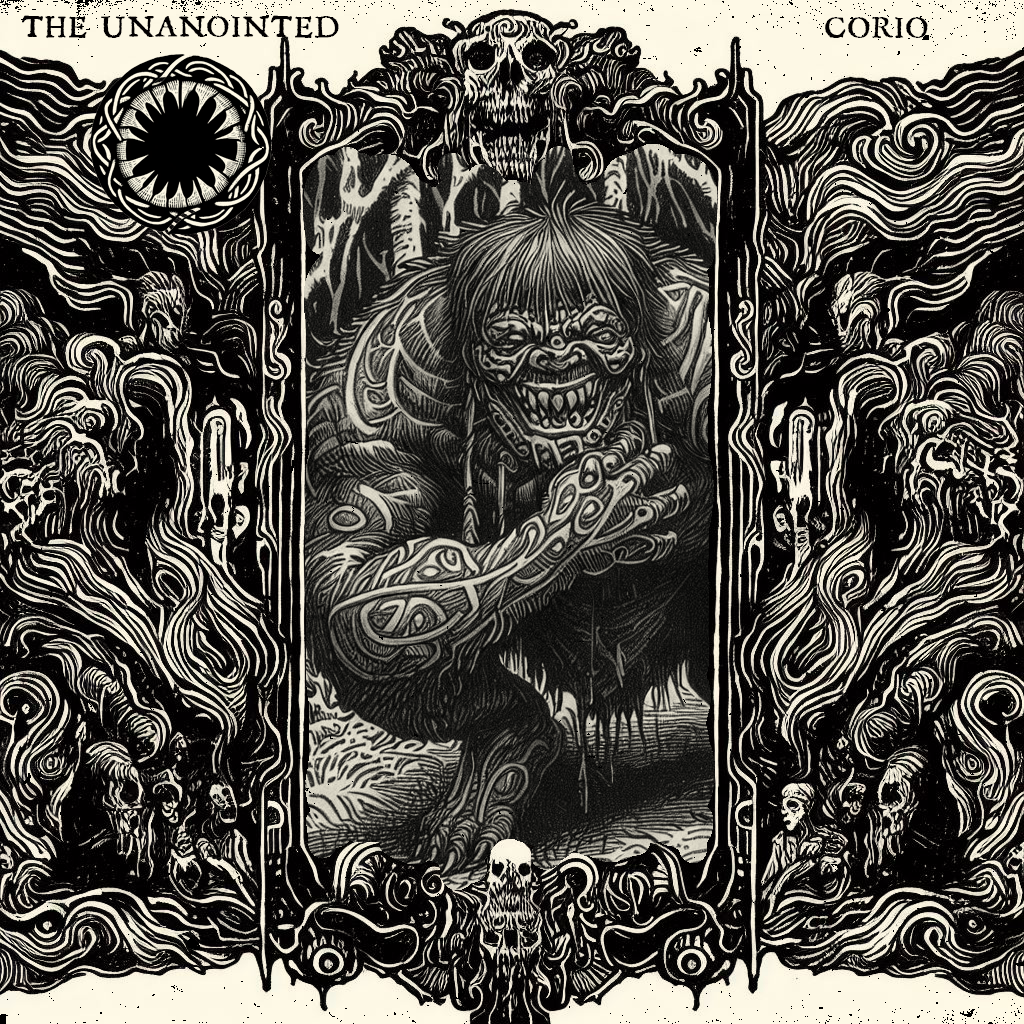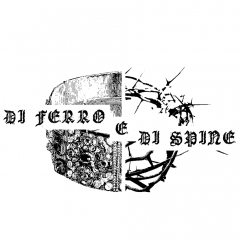Iconics: Corio

The introduction to the iconic characters continues with Corio, a member of a primitive race of cannibals punished by God for their distance from the doctrine of the true Faith. In the world of Of Iron & Thorns, the peoples of Antiquity have survived in various forms up to the period in which the adventures take place, partly absorbed into the predominant ethnic strain of the known world, consisting largely of the descendants of Imperial Rome.
Celts today are a savage, primitive, degenerate race of cannibals from the Second Era. Their bones are thick, and their hair grows heavily on their tattooed bodies. Celts are the cannibal, heavily tattooed brutes that inhabit the forested hills and mountains of northern Italy and farther north. Their culture is primitive and bloodthirsty, based on strength and conquest. They prefer raw meat, particularly human flesh. Somewhere in the past, during the conquests in Gaul, the Celts were allowed to enter the Empire and accept the worship of Christ. Those who declined in preference to their false gods were gradually brought to a primitive, apelike state. They are stooped and have teeth that they file for use as weapons. One of the pregenerated PCs is a Celtic monatto who converted to Christianity.
Excerpt from Shadows of the Sunken Dread
Although at the end of the Third Samnite War, which had seen the coalition of ancient peoples against the rising power of Rome, the numerous Celtic tribes of Gaul had begun to withdraw to remote places, it was only with the declaration of Christianity as the universal religion after the Battle of the Milvian Bridge that the peoples of antiquity (not only the Celts but also the Ligurians, Umbrians, Etruscans, Samnites, and others) were punished for their pagan view of creation, becoming those collectively called The Unanointed, heretical peoples of the second era. The mutations were slow and inexorable, sparing those who willingly chose to embrace faith in the One God. Among ancient populations, perhaps the Celtic one is the one that underwent a more rapid mutation; the evolutionary path began to reverse rapidly, reverting these tribes to a bestial state of cave-dwellers, massive, hunched, and simian, often with sharp teeth to better tear muscle tissues and tendons, and bodies covered in tattoos, scarifications, and bone ornaments. Celts mostly inhabit the Empire’s unpatrolled forests, living in an almost perpetual state of war with neighboring tribes. An important enclave near the wooded hills of Modena gave birth to Corio.
In 5th edition terms, Corio is a barbarian-ranger with a handful of traits derived from his devolved ancestry. In this setting, the Celts roughly fill the role of orcs. They are populous, warmongering, and follow tribal and primitive practices, often residing in remote areas.
Here again you will find, as in Floramonda‘s sheet, the humoral stats, but the relevant thing is that Corio is not baptized. He therefore does not suffer the limitation of the peace of God but may be subject to an heightened vulnerability to demonic possession and unholy black magic and other disadvantages that will be described elsewhere.
Corio
Medium humanoid (celt), chaotic neutral, unbaptized
Patron: None
Sainthood: 0
Armor Class: 14 (thick skin, Dex)
Hit Points: xx (3d12)
Speed: 40 ft.
| Str | Dex | Con | Int | Wis | Cha |
|---|---|---|---|---|---|
| 16 (+2) | 14 (+2) | 12 (+1) | 8 (-1) | 12 (+1) | 8 (-1) |
Humors: as mentioned before Corio is melancholic. The barbarian is a melancholic and introverted individual, with a primal and feral nature. He is fiercely independent and self-sufficient, relying on his instincts and his connection to the natural world to survive. He can be fiercely protective of his allies and his territory.
He has advantage on saving throws toward negative effects on black bile humor damage (e.g., digestive issues, food poisoning, pain and intellectual disorders).
Skills: Athletics +5, Nature +3, Perception +3, Survival +3
Senses: passive Perception 13
Languages: Common
Actions
- Greataxe. Melee Weapon Attack: +5 to hit, reach 5 ft., one target. Hit: (1d12 + 3) slashing damage.
- Javelin. Melee or Ranged Weapon Attack: +5 to hit, reach 5 ft. or range 30/120 ft., one target. Hit: (1d6 + 3) piercing damage.
- Equipment Hide armor, greataxe, 2 javelins, backpack, bedroll, mess kit, tinderbox, 10 torches, 10 days of rations, waterskin, 5 GP.
Features and Traits
Unanointed Corio, being one of The Unanointed, bears the mark of ancient paganism. He has an innate resilience against certain negative effects stemming from the dark times of the second era. Corio has advantage on saving throws against spells and effects that attempt to manipulate or control his mind, reflecting his resistance to unholy influence due to his pagan heritage.
Devoluted Brain and Body Corio’s devolved nature grants him an uncanny resistance to certain ailments. He has advantage on saving throws towards negative effects related to physical afflictions, such as diseases and poisons. His body’s primal resilience protects him against various forms of physical harm, emphasizing his robust and enduring nature.
Monatto Corio, having worked as a monatto, possesses a keen understanding of the art of survival and scavenging. He can efficiently find resources in the wild, allowing him to forage for food, water, and other essentials with expertise. Additionally, he has an innate ability to sense the presence of undead creatures, making him a valuable asset in detecting supernatural threats.
Martial Archetype: tracker. When you choose this martial archetype at 3rd level, you gain proficiency in the Survival skill, and your proficiency bonus is doubled for any ability check you make that uses this skill.
Personality.
Corio is often silent and has some difficulty in explaining his ideas in he language of modern man. He is instictual and very loyal, wiser than anyone can guess. He had no ambitions besides living a peaceful life but recent events dragged him in a conflict the likes the world has never seen before.
History
When papal forces decided to strengthen their military presence in the hills of Bologna, several expeditions were sent to eradicate the most dangerous threats to civilization. Units of monster hunters and militant monastic orders were deployed to establish forts and watchtowers on the foothill border. Among them was Father Theobald, still a young initiate.
Attacked by a group of Celts, a massacre was averted thanks to the lookout, Corio, who, after finding survivors, decided not to betray their location. When reinforcements arrived, Theobald chose to intervene on behalf of the Celti, requesting him as a slave for the heavy labor of the diocese. In the following years, Corio worked as a monatto, having survived the plague.
In the period following the Night of Screams, Corio is possessed by a demon and later freed by Father Theobald. When Lady Floramonda returned to Bologna, she decided to save the two companions by incorporating them into her company. Theobald and Corio left their sanctuary in Bologna to serve the will of God.
